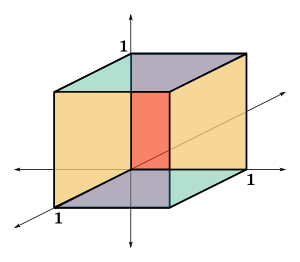Unit cube
A unit cube, more formally a cube of side 1, is a cube whose sides are 1 unit long.[1][2] The volume of a 3-dimensional unit cube is 1 cubic unit, and its total surface area is 6 square units.[3]

Unit cube
Unit hypercube
The term unit cube or unit hypercube is also used for hypercubes, or "cubes" in n-dimensional spaces, for values of n other than 3 and edge length 1.[1][2]
Sometimes the term "unit cube" refers in specific to the set [0, 1]n of all n-tuples of numbers in the interval [0, 1].[1]
The length of the longest diagonal of a unit hypercube of n dimensions is , the square root of n and the (Euclidean) length of the vector (1,1,1,....1,1) in n-dimensional space.[2]
gollark: ħ
gollark: Roleplaying what?
gollark: Yes, I just have the sound mostly off.
gollark: <@711227962401226793>
gollark: <:1_:802634312960704573><:1_:802634312960704573> <:1_:802634312960704573><:1_:802634312960704573><:1_:802634312960704573><:1_:802634312960704573><:1_:802634312960704573><:1_:802634312960704573> <:1_:802634312960704573><:1_:802634312960704573><:1_:802634312960704573><:1_:802634312960704573> <:1_:802634312960704573><:1_:802634312960704573><:1_:802634312960704573><:1_:802634312960704573> <:1_:802634312960704573><:1_:802634312960704573> <:1_:802634312960704573><:1_:802634312960704573> <:1_:802634312960704573><:1_:802634312960704573><:1_:802634312960704573><:1_:802634312960704573><:1_:802634312960704573><:1_:802634312960704573><:1_:802634312960704573><:1_:802634312960704573> <:1_:802634312960704573><:1_:802634312960704573><:1_:802634312960704573><:1_:802634312960704573><:1_:802634312960704573><:1_:802634312960704573><:1_:802634312960704573><:1_:802634312960704573> <:1_:802634312960704573><:1_:802634312960704573> <:1_:802634312960704573><:1_:802634312960704573> <:1_:802634312960704573><:1_:802634312960704573> <:1_:802634312960704573><:1_:802634312960704573> <:1_:802634312960704573><:1_:802634312960704573><:1_:802634312960704573><:1_:802634312960704573><:1_:802634312960704573><:1_:802634312960704573> <:1_:802634312960704573><:1_:802634312960704573><:1_:802634312960704573><:1_:802634312960704573><:1_:802634312960704573><:1_:802634312960704573> <:1_:802634312960704573><:1_:802634312960704573><:1_:802634312960704573><:1_:802634312960704573><:1_:802634312960704573><:1_:802634312960704573>
See also
- Doubling the cube
- K-cell
- Robbins constant, the average distance between two random points in a unit cube
- Tychonoff cube, an infinite-dimensional analogue of the unit cube
- Unit square
- Unit sphere
References
- Ball, Keith (2010), "High-dimensional geometry and its probabilistic analogues", in Gowers, Timothy (ed.), The Princeton Companion to Mathematics, Princeton University Press, pp. 670–680, ISBN 9781400830398. See in particular p. 671.
- Gardner, Martin (2001), "Chapter 13: Hypercubes", The Colossal Book of Mathematics: Classic Puzzles, Paradoxes, and Problems : Number Theory, Algebra, Geometry, Probability, Topology, Game Theory, Infinity, and Other Topics of Recreational Mathematics, W. W. Norton & Company, pp. 162–174, ISBN 9780393020236.
- Geometry: Reteaching Masters, Holt Rinehart & Winston, 2001, p. 74, ISBN 9780030543289.
External links
This article is issued from Wikipedia. The text is licensed under Creative Commons - Attribution - Sharealike. Additional terms may apply for the media files.